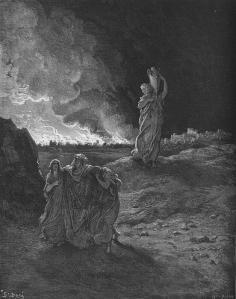This essay first appeared on Cliterati on April 28th; I have modified it slightly for time references and to fit the format of this blog.
The ancients believed that there was power in names, and that they could be employed in spells designed to control or harm the thing so named. Beings of power were believed to know when their own names were spoken aloud, and might turn unwelcome attention upon the speaker (hence the expression “Speak of the Devil…”); similarly, evil spirits who overheard a topic being discussed aloud might take glee in ruining something good or exacerbating something bad, which is why people still knock wood or say “God willing” after talking about a positive development, or speak about disease and misfortune in hushed tones or euphemisms. Given the traditional importance of offspring, it’s no surprise that taboos developed around the act which creates them, nor that our ancestors couched everything related to that act in euphemisms and evasion and hid the generative organs from the sight of malign entities who might hex them.
 The world has changed a great deal, and children are no longer vital helpers for our farms, caretakers of our twilight years and inheritors of our property; furthermore, few of us believe in evil spirits or magic words any longer. Yet the superstitions around sex continue; we pretend that it is magically different from all other human behavior, that the normal rules do not apply where it is concerned, that doing it in the “wrong” way or for the “wrong” reason is somehow ritually unclean or even harmful, that rules and laws are necessary to control it, and that violating such rules is a Very Serious Matter indeed. The most atavistic among us even claim that the sight of pictures of humans engaging in sex is “harmful” to those for whom the apparent position of the sun has not yet returned eighteen times (a number of great cabalistic significance, no doubt) to the same astrological orientation as it was at their birth; moreover, the very existence of these pictures is claimed to inflict magical harm on women, whether we gaze upon them or not!
The world has changed a great deal, and children are no longer vital helpers for our farms, caretakers of our twilight years and inheritors of our property; furthermore, few of us believe in evil spirits or magic words any longer. Yet the superstitions around sex continue; we pretend that it is magically different from all other human behavior, that the normal rules do not apply where it is concerned, that doing it in the “wrong” way or for the “wrong” reason is somehow ritually unclean or even harmful, that rules and laws are necessary to control it, and that violating such rules is a Very Serious Matter indeed. The most atavistic among us even claim that the sight of pictures of humans engaging in sex is “harmful” to those for whom the apparent position of the sun has not yet returned eighteen times (a number of great cabalistic significance, no doubt) to the same astrological orientation as it was at their birth; moreover, the very existence of these pictures is claimed to inflict magical harm on women, whether we gaze upon them or not!
Given the enduring popularity of these fantastical beliefs, it’s no surprise when politicians and others who pander to the lowest common denominator embrace them. But when a commercial enterprise does so, the results can be absolutely ridiculous; it’s not possible to please both those who are sexually mature and those who believe that their salvation depends on depriving other people they don’t even know of sexual entertainment, but by Aphrodite they sure will try! Take Amazon, for example:
[In April], without warning, Amazon removed the ability of anything rated “adult” to show up in a search on its main website. Upmarket porn is still there; but to find it, you have to…search specifically for the title…Previously, this sort of filtering had only been applied to books which contained things like incest…but now it’s…all erotic fiction. Even 50 Shades of Grey, one of the most ubiquitous books in the world right now, is caught by the filter. Obviously, this makes it much harder to find very ordinary smut…This level of prudishness, of trying to protect adults from themselves, is pathetic. It’s yet another example of pre-emptive, absurdly risk-averse censorship, appeasing a probably non-existent offended user...
It’s not just Amazon, of course. Plenty of other tech companies are ludicrously prudish. Apple is notorious for maintaining a ”no porn” rule in the app store, as well as banning smutty books from its iBooks store chart, even joining repressive Middle Eastern regimes in refusing to publish books because the covers display female backs and bottoms. PayPal has refused to accept payments for “adult” purchases of books...
You can also add Hitachi to that list:
…the classic Hitachi Magic Wand…has always been marketed as a “muscle massager” and currently features lovely pictures of 1980s-era models on its box, innocently placing the wand on their necks or shoulders…it has been a perennial bestseller in sex toy shops across the country and has been used in hundreds, if not thousands, of pornographic films. It’s so popular that a number of companies not affiliated with Hitachi create accessories for it—especially caps that pop over the head to turn the wand into things like a male masturbation sleeve or an insertable g-spot stimulator. Why do people love it? Simply put, it’s one of the strongest vibes out there. Most vibrators are battery-operated or rechargeable, but the Magic Wand plugs into a wall socket for maximum power. Its long handle houses a relatively large motor, and its tennis-ball-sized head shakes so vigorously that prolonged use can leave body parts numb and tingling. For some people, this supercharged toy is the only thing that can ensure an orgasm…It is also extremely sturdy and will last for decades.
Despite its popularity, its…manufacturer has been growing increasingly uncomfortable with the Magic Wand’s reputation as a sex toy. Hitachi…also makes…many other products, and it doesn’t want its brand name to be primarily associated with orgasms…[so it] had decided to stop manufacturing the Magic Wand altogether. [US distributor] Vibratex, sensing the wailing, gnashing of teeth and possible rioting that would ensue if this came to pass, convinced the company to keep producing it, but remove the Hitachi name..in June, the Hitachi Magic Wand will be re-launched as the Original Magic Wand, with new packaging and a slightly different design…
 Unlike ultra-puritan Apple and Paypal, Amazon and Hitachi are more than happy to profit from sex; they simply want their connection with it to be obscured. Like writing “f**k”, this will fool exactly nobody and just makes those who indulge in the practice look juvenile and rather pathetic. Obscuring or avoiding words while maintaining the reality to which those words refer is no different from my grandmothers whispering words like “cancer” or Harry Potter characters referring to Voldemort as “He Who Must Not Be Named”; it’s a primitive attempt to hedge off evil by keeping a taboo subject behind a veil.
Unlike ultra-puritan Apple and Paypal, Amazon and Hitachi are more than happy to profit from sex; they simply want their connection with it to be obscured. Like writing “f**k”, this will fool exactly nobody and just makes those who indulge in the practice look juvenile and rather pathetic. Obscuring or avoiding words while maintaining the reality to which those words refer is no different from my grandmothers whispering words like “cancer” or Harry Potter characters referring to Voldemort as “He Who Must Not Be Named”; it’s a primitive attempt to hedge off evil by keeping a taboo subject behind a veil.
